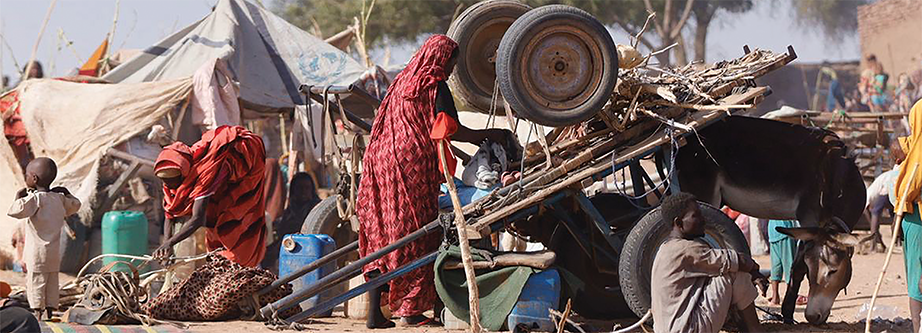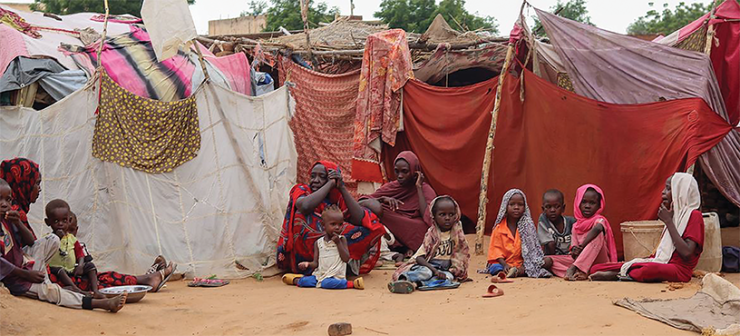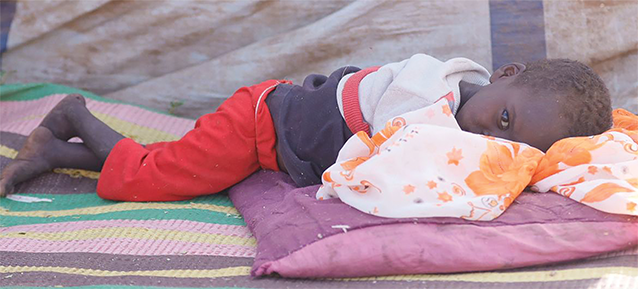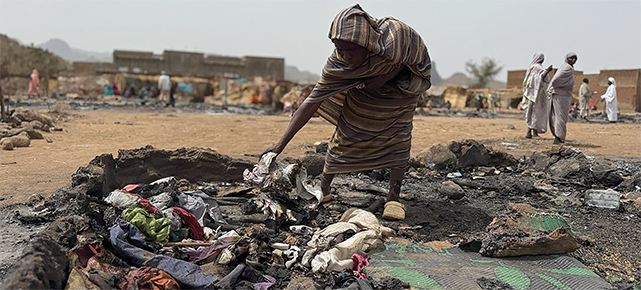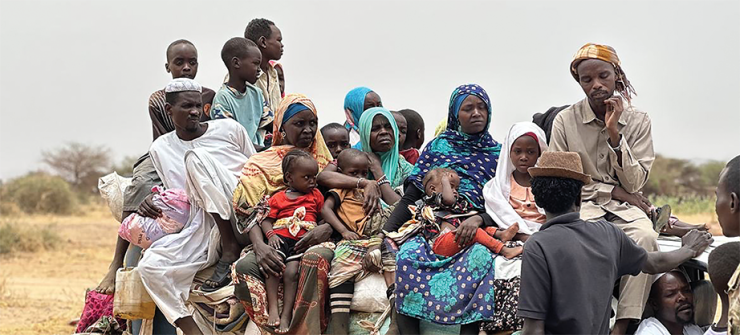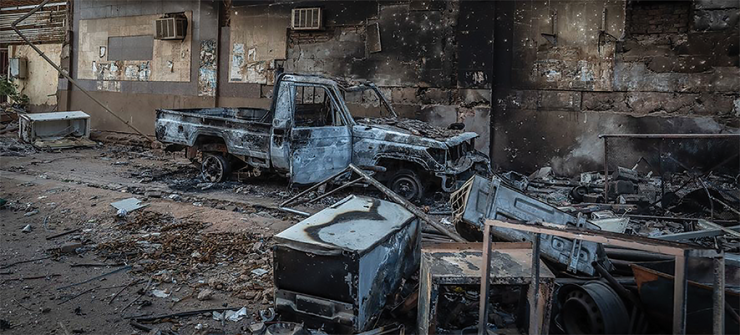CRISIS: Popular organisations and movements across Africa and beyond have condemned the ongoing massacre of the Sudanese people by the Rapid Support Forces (RSF), calling for an immediate end to the violence…
By Nicholas Mwangi
Across Africa and the world, progressive and popular organizations are raising their voices in solidarity with the people of Sudan, as they face one of the most brutal and protracted conflicts in the world today. From Ghana to South Africa, from international networks to grassroots movements, the message is unified in a call to end the massacres, open humanitarian corridors, and uphold the Sudanese people’s struggle for justice, peace, and sovereignty.
Amid mounting international condemnation for its war crimes, especially over the last several weeks, the Rapid Support Forces (RSF) have reportedly agreed to a three-month pause in the fighting. However, analysts and activists argue that the “humanitarian ceasefire” is far from a solution to the two-and-a-half-year war.
The Socialist Movement of Ghana (SMG) condemned the “genocidal conflict between factions of the militarized elite” that has terrorised the people of Sudan since 2023.
In their statement, the movement expressed solidarity with the Sudanese people and their popular organizations, including the Sudanese Communist Party (SCP), lauding their courage and political clarity in the face of devastation.
The SMG statement described the war between the Sudanese Armed Forces (SAF) and the RSF as a tragic consequence of elite rivalries and foreign interference. It denounced the “murky transnational corporate and resource-grabbing agenda of the United States, Western powers, and some Arab and East African countries” fueling the conflict.
“The people of Sudan clearly reject both warring factions and any national ‘solution’ based on military force or elite interests,” SMG declared, reaffirming that Sudan’s revolution, born out of the people’s 2018 uprising, continues to embody the demand for democracy, justice, and full sovereignty over national resources.
The International Peoples’ Assembly (IPA) and Pan Africanism Today (PAT) also issued a joint statement condemning the “brutal massacres currently unfolding in Sudan,” particularly in El-Fasher, Bara, Darfur, and Kordofan, describing the atrocities as genocide. They called for immediate international mobilization, demanding a ceasefire, protection of civilians, and independent investigations into war crimes.
“The Sudanese people face a destructive war machine, defending their dignity, communities, and right to live,” the statement read. It called upon trade unions, women’s movements, youth, and social movements worldwide to stand with Sudan through coordinated actions, educational events, and artistic expressions of solidarity.
Joining this call, South Africa’s Abahlali baseMjondolo Movement, representing shack dwellers and grassroots activists, issued a solidarity statement denouncing the ongoing massacres in El-Fasher and Darfur.
The movement condemned the RSF’s atrocities; executions, mass killings, and the starvation of entire communities, financed by the United Arab Emirates and sustained by European complicity in migration control.
“The uprising that began in December 2018 was a democratic revolt of workers, women, students and the urban poor,” Abahlali’s statement reminded. “That uprising gave rise to new grass-roots forms of democracy through the resistance committees, which continue to provide food, medicine, and mutual aid amid war.”
Sudan’s struggle is our struggle. As the Socialist Movement of Ghana declared: “Let us stand for unity, sovereignty, and development. Sudan’s struggle is Africa’s struggle.”
NOVEMBER 6: The UN Special Adviser on genocide prevention has raised concerns over widespread allegations of war crimes committed in Sudan’s El Fasher last month, and plans to meet his African Union counterpart on Friday to discuss a coordinated response.
“We see massive violations of international human rights law, direct attacks on civilians, noncompliance with international humanitarian law, which regulates conduct in relation to hostilities, and that the attacks are largely on civilians,” said Chaloka Beyani, who recently took up his post as Special Adviser of the Secretary-General for the Prevention of Genocide.
Beyani told UN News in an interview on Thursday he had spoken to Resident Coordinator in Sudan, Denise Brown, and plans to issue an advisory to Secretary-General António Guterres, the Security Council, and the wider UN system.
“Once our office sounds the alarm, the alarm rings over and beyond the ordinary violations of human rights or of international humanitarian law,” he said. “It indicates that the threshold is about to be crossed, and therefore there has to be early action taken.”
Graphic reports and video began circulating at the end of last month online of apparent war crimes committed by the Rapid Support Forces (RSF) militia as its fighters finally took control of the Darfuri capital of El Fasher from Government troops, following more than 500 days of siege.
Horror in Darfur
“We cannot hear the screams, but – as we sit here today – the horror is continuing,” said UN relief chief Tom Fletcher, briefing the Security Council on October 31. Beyani’s office said risk indicators for atrocity crimes are present in Sudan but emphasises that only an international court or other legal body can make a determination of genocide.
The UN-backed International Criminal Court (ICC) expressed profound alarm in a statement on Monday over the reports of mass killings, rapes and other crimes emerging from El Fasher, noting that its investigation of alleged war crimes committed since the outbreak of war in April 2023 is ongoing.
“Within the ongoing investigation, the office is taking immediate steps regarding the alleged crimes in El-Fasher to preserve and collect relevant evidence for its use in future prosecutions,” the prosecutor’s office underlined.
RSF agrees ‘humanitarian ceasefire’: reports
The RSF reportedly agreed to a “humanitarian ceasefire” on Thursday, in the wake of mounting criticism of its fighters’ actions in and around El Fasher.
Leaders of the militia group said they would accept the terms of the truce proposed by a mediation group consisting of the United States, Saudi Arabia and the United Arab Emirates, according to news reports.
‘Darker hell’
El Fasher has “descended into an even darker hell,” senior UN officials warned on October 30, as the Rapid Support Forces (RSF) militia seized control of the North Darfur capital after a 500-day siege, forcing tens of thousands to flee on foot amid reports of mass executions, rape and starvation.
Briefing ambassadors in the Security Council, the UN’s top relief official Tom Fletcher said “women and girls are being raped, people being mutilated and killed – with utter impunity,” adding: “We cannot hear the screams, but – as we sit here today – the horror is continuing.”
After overrunning the Sudanese Armed Forces’ (SAF) last major stronghold in Darfur which had held out for over 500 days, RSF fighters moved house to house, he said, with “credible reports of widespread executions” as civilians attempted to escape.
Nearly 500 patients and their companions were reportedly killed in the Saudi Maternity Hospital, one of numerous health facilities targeted in the fighting.
History of atrocity in Darfur
“What is unfolding in El Fasher recalls the horrors Darfur was subjected to twenty years ago,” Fletcher said, referring to the atrocities of the early 2000s that shocked the world and eventually led to International Criminal Court indictments.
“But somehow today we are seeing a very different global reaction – one of resignation,” he continued. “This is also a crisis of apathy.”
Descent into all-out war
The conflict in Sudan began in April 2023, when a long-simmering power struggle between the SAF and RSF erupted into open war.
The RSF traces its roots to the Janjaweed militias accused of atrocities in Darfur 20 years ago, while the SAF represents the remnants of long-standing military rule from Khartoum.
Both forces once shared power after the 2019 ouster of former president Omar al-Bashir, but a dispute over integrating the RSF into the national army triggered a nationwide collapse.
What began as a contest for control of the State has since devolved into a brutal struggle marked by ethnic killings, urban siege warfare, mass displacement, and famine conditions across large parts of the country.
Regional spillover
More than four million people have already fled into neighbouring Chad, South Sudan and the Central African Republic, straining humanitarian operations and heightening instability in already fragile border regions.
Inside Sudan, more than 24 million people – over 40 per cent of the population – are food insecure. Tawila, the main destination some 50kms away for those fleeing El Fasher, is already hosting hundreds of thousands displaced by earlier attacks.
“Our teams in Tawila are seeing traumatised people arriving showing shocking signs of malnutrition,” Fletcher said.
‘Blood on the sand. Blood on the hands’
Fletcher said the Council must act “with immediate and robust action” to stop atrocities, ensure safe humanitarian access, and halt flows of weapons fuelling the war.
“I urge colleagues to study the latest satellite imagery of El Fasher; blood on the sand,” he told ambassadors. “And I urge colleagues to study the world’s continued failure to stop this. Blood on the hands.” – People’s Despatch/UN News

